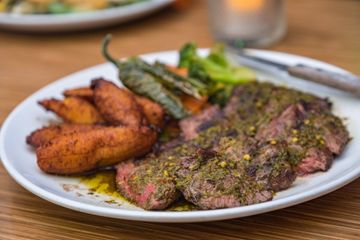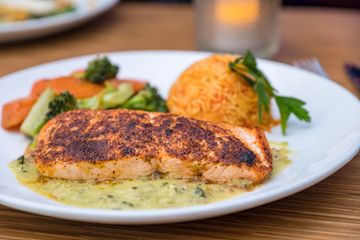Is Mexican Food Healthy And Balanced? Unboxing the Nutritional Perks of Traditional Components
The inquiry of whether Mexican food is healthy invites an exploration of its traditional ingredients. Beans and corn function as foundational staples, rich in healthy protein and fiber. Avocados supply helpful fats, while various herbs and spices add taste and wellness benefits - freshly made guacamole. Together, these components develop a tapestry of nourishment. The healthiness of Mexican food typically depends on preparation techniques and portion sizes. What role do these factors play in identifying its total nutritional value?
The Power of Beans: Protein and Fiber-Rich Staples
Although frequently overlooked, beans work as a cornerstone of Mexican food, offering a riches of dietary benefits. Rich in healthy protein, they are an outstanding plant-based option for those seeking to meet their nutritional healthy protein needs. This high healthy protein material sustains muscular tissue repair and development, making beans vital for both vegetarians and meat-eaters alike. Additionally, beans are an outstanding resource of nutritional fiber, which helps in food digestion and advertises a sensation of fullness, possibly aiding with weight monitoring.
The range of beans used in Mexican dishes, such as black beans, pinto beans, and kidney beans, adds to a diverse taste profile and can boost meals nutritionally. Beans are reduced in fat and consist of crucial vitamins and minerals, consisting of magnesium, iron, and folate. Together, these features make beans an important component, providing both sustenance and sustenance in standard Mexican price.

Corn: a Versatile Grain With Nutritional Conveniences
Corn stands apart as a flexible grain basic to Mexican cuisine, commemorated not just for its culinary applications yet also for its outstanding dietary profile. As a main ingredient in recipes like tortillas, tamales, and pozole, corn offers crucial nutrients that add to a balanced diet. Rich in carbohydrates, it works as a considerable energy resource, while likewise being reduced in fat, making it a positive option for different nutritional needs.
Moreover, corn is a great resource of dietary fiber, which assists in digestion and advertises satiety. It has considerable amounts of vitamins such as B-complex vitamins, which are necessary for basal metabolism. The presence of antioxidants, particularly carotenoids, adds to total health and wellness by reducing oxidative anxiety. Additionally, corn is gluten-free, satisfying those with gluten sensitivities. Overall, the dietary benefits of corn emphasize its relevance in typical Mexican food and its duty in a healthy diet.
Avocados: Healthy Fats and Nutrients in Every Bite
Avocados play a substantial function in Mexican cuisine, enhancing dishes with their creamy appearance and rich flavor. Beyond their culinary allure, avocados are celebrated for their remarkable dietary profile. They are an abundant source of healthy monounsaturated fats, which can help reduced bad cholesterol degrees and assistance heart health. Furthermore, avocados are loaded with necessary vitamins and minerals, consisting of potassium, vitamin E, and B vitamins, adding to total health.
The high fiber material in avocados help food digestion and promotes satiation, making them a valuable addition to any dish. Their special nutrient make-up can additionally sustain skin health and wellness and supply anti-inflammatory benefits. Incorporating avocados into typical Mexican recipes or appreciating them as a standalone snack can enhance both taste and nourishment, demonstrating why they are a beloved staple in Mexican cuisine. this article Generally, avocados use a delicious way to appreciate healthy and balanced fats and critical nutrients in every bite.
Seasonings and Herbs: Flavorful Health And Wellness Boosters
While enjoying the abundant tastes of Mexican food, one can not forget the important duty that spices and natural herbs play in improving both preference and wellness. Active ingredients such as cilantro, oregano, and chili peppers not only add to the vibrant taste account however likewise offer substantial wellness benefits. Cilantro is known for its purifying properties, assisting to eliminate heavy metals from the body, while oregano is packed with anti-oxidants and possesses anti-inflammatory effects.
Chili peppers, a staple in many Mexican recipes, include capsaicin, which has actually been connected to improved metabolic rate and pain relief. Additionally, spices like cumin and coriander assistance digestion and may assist in blood sugar level law. Including these savory wellness boosters right into dishes not just improves the culinary experience however additionally advertises total wellness, making Mexican food not simply scrumptious, however likewise nutritionally beneficial.
Conventional Food Preparation Techniques: Enhancing Nutrition and Taste
Typical food preparation techniques in Mexican cuisine play an important role in boosting both nourishment and flavor, as they typically prioritize fresh ingredients and classic strategies. Strategies such as nixtamalization, where corn is soaked and cooked in an alkaline remedy, not only boost the nutrient account of tortillas however additionally enhance their digestibility - churros. Furthermore, the use of slow-moving food preparation methods, like cooking or braising, allows tastes to fuse perfectly while preserving the honesty of the ingredients

Regularly Asked Concerns
Are Mexican Food Portions Commonly Larger Than Various Other Cuisines?
Mexican food portions are often bigger than those of several various other foods. This particular shows conventional eating practices, stressing common sharing and hearty meals, which can result in a more considerable serving size overall.
Exactly how Does the Preparation Method Affect Healthfulness of Mexican Food?
Preparation approaches considerably influence the healthfulness of Mexican food. Methods such as barbecuing or steaming preserve nutrients, while frying can raise undesirable fat web content. Options of active ingredients and cooking styles inevitably identify total dietary worth.
Can Mexican Food Be Tailored for Details Dietary Limitations?
Mexican food can certainly be customized for specific nutritional restrictions. Alternatives, shogun sushi such as utilizing corn tortillas recommended you read for gluten-free diets or integrating more veggies, enable individuals to enjoy standard tastes while accommodating different dietary needs.
What Are Typical Mistaken Beliefs About Mexican Food and Health?
Usual misconceptions regarding Mexican food consist of the idea that it is naturally unhealthy, excessively hot, and only focused on fats. Actually, standard dishes typically include nourishing components and can be tailored to different nutritional demands.
Exist Healthier Options at Mexican Restaurants?
Healthier choices at Mexican dining establishments frequently consist of grilled meats, beans, and fresh veggies. Picking meals that highlight entire active ingredients and avoiding hefty sauces can result in a more nourishing eating experience, advertising general well-being.
The selection of beans used in Mexican recipes, such as black beans, pinto beans, and kidney beans, adds to a varied flavor account and can boost meals nutritionally. Avocados play a substantial role in Mexican cuisine, matching meals with their velvety structure and rich flavor. Incorporating avocados into conventional Mexican dishes or appreciating them as a standalone treat can enhance both flavor and nourishment, showing why they are a beloved staple in Mexican food. While taking pleasure in the rich tastes of Mexican food, one can not neglect the important role that spices and natural herbs play in enhancing both preference and health. Traditional food preparation techniques in Mexican cuisine play a crucial function in enhancing both nourishment and flavor, as they typically focus on time-honored methods and fresh ingredients.